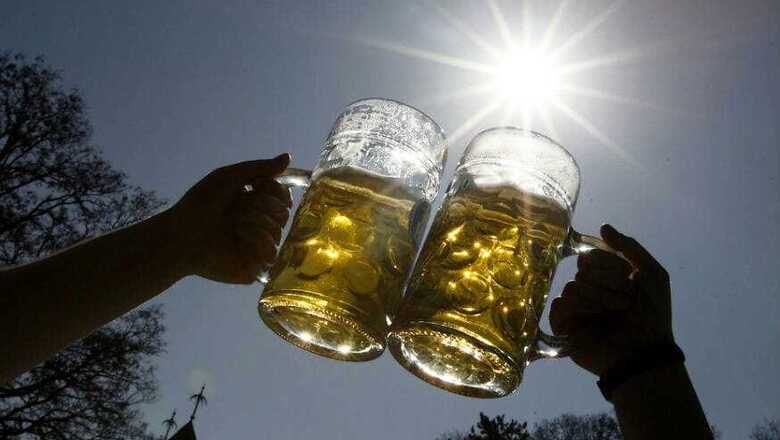
views
 Toasting is immense fun. Unless you have a Viking (one of the Norse warriors who plundered Europe from 8th to 11th Century) sitting opposite on the table.
Toasting is immense fun. Unless you have a Viking (one of the Norse warriors who plundered Europe from 8th to 11th Century) sitting opposite on the table.
Well, if you have one, sorry, I must warn you, things get hot really fast. Don’t dare to take your eyes off him as you say your toast. Otherwise, you have every chance to end the day with an axe lodged deep inside your skull.
Now say cheers.
We pray to absent friends, raising our glasses and clink. But how many of us know this ‘cheers’ up close? The word means, ‘may you be of good cheer’. But what is the meaning behind the ritual? There are three stories going around:
1) Once upon a time, people shared a single cup brimmed with wine. When more cups came to the party, people wanted to retain something of the good ole times. They clinked to symbolically blend cups into one.
2) The Vikings knew who Vikings were. The geniuses among the barbarians observed that clinking sloshed the wine so violently that the liquid sloshed and leaped from glass to glass in the impact. So even if someone in the group had spiked the drink with poison, he would also get the same medicine. What an idea sirji!
3) Clinking fools the devil. Many believed that the devil takes the clinking of the glass to be a tolling church bell. Terrified, he would flee with his tail tucked between his legs. (But cynics believe that it could be only the devil’s ploy to wean away the Almighty from the tavern, since he is a hardcore spoilsport, by giving him a false impression that church services have started and the priest is waiting for him at the church).
You know what English toast-masters in ancient times used to bellow at their guests before drinking?
“Take off your heal-tap,” they bellowed.
Hey, don’t freeze there with that drink in your hand! What they meant is “drain your glasses” so that they could be refilled. Heel-tap is the liquor left at the bottom of a glass after drinking (lees).
And you know what ‘daylight’ or ‘starlight’ is? It is the space between the rim of a glass and the surface of liquor, the unfilled part of a glass.
Now you understand what Shelley’s toast in the work, Oedipus Tyrranus, means:
“All: A toast! A toast! Darky: No heel-tap – darken daylights.”
English professors might read a thousand meanings in those lines. A drunkard knows the right one — “Bro,” he would say, “darken daylights means to fill it up to the brim of the glass.”
Now tell me. Were you a Roman in any of your previous lives? Then you had followed the leges compotandi, those drinking guidelines. Reading from our times, some of the guidelines and customs look scary. One law states that, as part of toasting, you have to drink to every letter of your wife’s name.
Here’s a toast poem from history:
With six full bumpers Noevia’s health be crowned
Let seven at Justina’s name go around
Let five at Lycas, Four at Lyde be;
But at the name of Ida fill but three
Thank God, we are not living in Roman times anymore. With my wife Divya, I’d have to call it a day after five toasts and five shots. I would have killed myself with jealousy listening to the celebrations going on in my neighbourhood until early morning. (My neighbour’s wife is Vishalakshi Ammal Janardhanan. How handy that would have been!)
Romans loved their wives, weak and fragile. A pale wife always gave them an excuse to toast to their health. Even up to 17th century, such women were in great demand as wives for drinking occasions. You haven’t got the point right? Read John Suckling’s poem:
She’s pretty to walk with
And witty to talk with
And pleasant too to think on:
But the best use of all
Is, her health is a stale,
And helps to make us drink on.
It was not only the wives who were taken for a toast-ride in the past.
Many celebrities in history had serious doubts about the blind affection of the fawning fans and their concern for their health. In a royal proclamation, Charles II said:
”There are likewise another sort of men, of whom we have heard much, and are sufficiently ashamed, who spend their times in Taverns, Tippling-houses, and Debauches, giving no other evidence of their affection for us, but in drinking to our health.
The king knows he’s naked. Stop cheering him on.
(Manu Remakant is a freelance writer who also runs a video blog - A Cup of Kavitha - introducing world poetry to Malayalees. Views expressed here are personal)



















Comments
0 comment